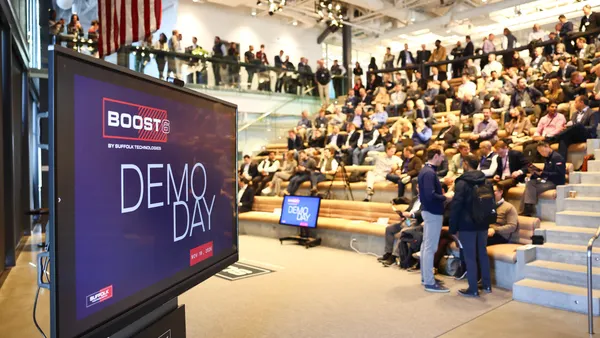Dive Brief:
-
Gilbane Building Co. is catching heat from New York City trade unions for increasingly using more nonunion subcontractors on city projects, The Wall Street Journal reported.
-
Officials at Gilbane said it currently has approximately $1.1 billion of work underway in the city, but onlookers said that criticism has escalated since the company has started to use nonunion labor on high-profile projects, such as a 1-million-square-foot office building renovation on Wall Street.
-
Some critics blame Gilbane for setting an example for other large city construction companies, some of which are rethinking their collective bargaining agreements with local trade unions.
Dive Insight:
As a way of voicing their opposition to Gilbane's hiring practices, unions have turned out at the contractor's construction sites and New York city office to hold protest rallies, complete with giant, inflatable rats — a nod to the supposed character of companies that hire nonunion workers.
William Gilbane III, who runs the company's New York office, said required union work rules, like "expensive laborers to push buttons on automatic elevators," drive up costs — which is one of the factors the company uses when deciding which subcontractors to hire. On the other hand, unions justify their higher wages by saying their workers provide a higher quality and safer product than their nonunion counterparts.
This backlash against Gilbane is another consequence of what seems to be a chipping away at the unions' grip on New York City's private construction industry. Nationwide, unions are dealing with lower membership, which is at an estimated half of what it was in 1983. Combine that with New York City fixtures like Tishman Construction opting not to renew union contracts, and it's no wonder that union members and their leadership are pushing back. However, union presence, along with prevailing wage pay scales, is still strong on public or publicly funded jobs.
Even a traditionally union city like Boston has made it easier for nonunion workers to provide labor to residential projects in order to meet housing goals, and Boston trade unions have also reduced their pay scales on certain housing projects, with various trades joining forces to provide a "discount package" if a developer promises to use only union labor.
Nevertheless, Gilbane denied the company is "union busting" in New York City and stressed that it wants the most qualified workers on the job, union or nonunion. The contractor also touted its emphasis on safety, as no worker has ever died on any of its New York projects. Earlier this year, Gilbane said it wants OSHA to mandate the use of safety harnesses for any construction worker operating above 6 feet. The contractor said the policy, which the company instituted on its own and is stricter than OSHA's requirements, has prevented at least 20 potentially fatal falls on Gilbane jobs.











